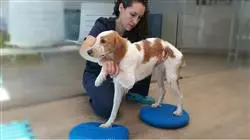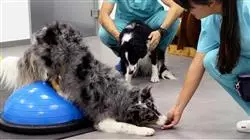University certificate
The world's largest faculty of veterinary medicine”
Introduction to the Program
A highly academic Postgraduate diploma that will allow you to acquire or update your knowledge in the field of motor pathology in small animals and their rehabilitation treatment"

This Postgraduate diploma begins with an in-depth focus on the rehabilitation of feline patients. The main obstacle in treating these patients is veterinarians lack of experience of the correct techniques, which is why, during the orthopedic examination, some signs may be overlooked, making the correct diagnosis difficult.
In reponse to this, the rehabilitation of orthopedic diseases will be addressed, among which Osteoarthrosis (OA) is emerging as one of the most prevelant diseases in felines, with studies indicating a prevalence of up to 90%.
Additionally, students will examine the characteristics that make water ideal during the recovery period after a number of conditions. In addition, it develops and compares the different therapeutic options offered by the use of the aquatic environment.
Veterinary sports medicine will also be studied, analyzing the reactions and adaptations the body makes during physical activity and the alterations suffered in the event of certain injuries or physical maladaptations.
First contact with the sports world will be made with the objective of optimizing the performance of each athlete, minimizing the risk of injury and deciding the best treatment and/or training plan for each animal.
Physiotherapy and veterinary rehabilitation will be viewed as a form of complimentary therapy for both medical and post-surgical locomotor treatments. In addition, they can be included as integrated analgesia therapy. The main objective of treatment is always to improve the patient’s quality of life by choosing the appropriate intervention methods and techniques for each case study.
TECH offers all this, with the aim of integrating medicine which always treats the animal in its entireity, since each animal manifests, suffers and responds differently to the same disease. Therefore, treatments should not simply be medical prescriptions, they should be tailored and personalized.
An intensive tour through the different disorders, conditions and injuries, with a special focus on the complex approach to domestic felines”
This Postgraduate diploma in Pathologies and Rehabilitation Plans in Small Animals contains the most complete and up-to-date scientific program on the market. The most important features include:
- The development of case studies presented by experts in Pathologies and Rehabilitation Plans in Small Animals
- The graphic, schematic, and eminently practical contents with which they are created, provide scientific and practical information on the disciplines that are essential for professional practice
- News on Pathologies and Rehabilitation Plans in Small Animals
- Practical exercises where self-assessment can be used to improve learning
- With special focus on innovative methodologies in Pathologies and Rehabilitation Plans in Small Animals
- Theoretical lessons, questions to the expert, debate forums on controversial topics, and individual reflection assignments
- Content that is accessible from any fixed or portable device with an Internet connection
A program supported by study aids which have been created to boost the value of the effort invested, converting your studies into skills in the shortest possible time”
The program includes, in its teaching staff, professionals belonging to the veterinary field, who bring their vast work experience to this specialization, in addition to recognized specialists from prestigious reference societies and universities.
TECH’s Multimedia Content, elaborated with the latest Educational Technology, will grant professionals a situated and contextual learning experience, that is to say, a simulated environment that will provide an immersive specialization programmed to train students in real situations.
This program is designed around Problem-Based Learning, whereby the specialist must try to solve the different professional practice situations that arise during the academic year. For this purpose, the professional will be assisted by an innovative interactive video system developed by recognized and experienced experts in Pathologies and Rehabilitation Plans in Small Animals.
You will learn with the highest rated study aids in the online teaching landscape, to facilitate the assimilation of knowledge and improve learning outcomes"

With the convenience of a program conceived to be fully adaptable to your needs, this Postgraduate diploma combines flexibility and efficiency with the best distance learning system"
Why study at TECH?
TECH is the world’s largest online university. With an impressive catalog of more than 14,000 university programs available in 11 languages, it is positioned as a leader in employability, with a 99% job placement rate. In addition, it relies on an enormous faculty of more than 6,000 professors of the highest international renown.

Study at the world's largest online university and guarantee your professional success. The future starts at TECH”
The world’s best online university according to FORBES
The prestigious Forbes magazine, specialized in business and finance, has highlighted TECH as “the world's best online university” This is what they have recently stated in an article in their digital edition in which they echo the success story of this institution, “thanks to the academic offer it provides, the selection of its teaching staff, and an innovative learning method aimed at educating the professionals of the future”
A revolutionary study method, a cutting-edge faculty and a practical focus: the key to TECH's success.
The most complete study plans on the university scene
TECH offers the most complete study plans on the university scene, with syllabuses that cover fundamental concepts and, at the same time, the main scientific advances in their specific scientific areas. In addition, these programs are continuously being updated to guarantee students the academic vanguard and the most in-demand professional skills. In this way, the university's qualifications provide its graduates with a significant advantage to propel their careers to success.
TECH offers the most comprehensive and intensive study plans on the current university scene.
A world-class teaching staff
TECH's teaching staff is made up of more than 6,000 professors with the highest international recognition. Professors, researchers and top executives of multinational companies, including Isaiah Covington, performance coach of the Boston Celtics; Magda Romanska, principal investigator at Harvard MetaLAB; Ignacio Wistumba, chairman of the department of translational molecular pathology at MD Anderson Cancer Center; and D.W. Pine, creative director of TIME magazine, among others.
Internationally renowned experts, specialized in different branches of Health, Technology, Communication and Business, form part of the TECH faculty.
A unique learning method
TECH is the first university to use Relearning in all its programs. It is the best online learning methodology, accredited with international teaching quality certifications, provided by prestigious educational agencies. In addition, this disruptive educational model is complemented with the “Case Method”, thereby setting up a unique online teaching strategy. Innovative teaching resources are also implemented, including detailed videos, infographics and interactive summaries.
TECH combines Relearning and the Case Method in all its university programs to guarantee excellent theoretical and practical learning, studying whenever and wherever you want.
The world's largest online university
TECH is the world’s largest online university. We are the largest educational institution, with the best and widest online educational catalog, one hundred percent online and covering the vast majority of areas of knowledge. We offer a large selection of our own degrees and accredited online undergraduate and postgraduate degrees. In total, more than 14,000 university degrees, in eleven different languages, make us the largest educational largest in the world.
TECH has the world's most extensive catalog of academic and official programs, available in more than 11 languages.
Google Premier Partner
The American technology giant has awarded TECH the Google Google Premier Partner badge. This award, which is only available to 3% of the world's companies, highlights the efficient, flexible and tailored experience that this university provides to students. The recognition as a Google Premier Partner not only accredits the maximum rigor, performance and investment in TECH's digital infrastructures, but also places this university as one of the world's leading technology companies.
Google has positioned TECH in the top 3% of the world's most important technology companies by awarding it its Google Premier Partner badge.
The official online university of the NBA
TECH is the official online university of the NBA. Thanks to our agreement with the biggest league in basketball, we offer our students exclusive university programs, as well as a wide variety of educational resources focused on the business of the league and other areas of the sports industry. Each program is made up of a uniquely designed syllabus and features exceptional guest hosts: professionals with a distinguished sports background who will offer their expertise on the most relevant topics.
TECH has been selected by the NBA, the world's top basketball league, as its official online university.
The top-rated university by its students
Students have positioned TECH as the world's top-rated university on the main review websites, with a highest rating of 4.9 out of 5, obtained from more than 1,000 reviews. These results consolidate TECH as the benchmark university institution at an international level, reflecting the excellence and positive impact of its educational model.” reflecting the excellence and positive impact of its educational model.”
TECH is the world’s top-rated university by its students.
Leaders in employability
TECH has managed to become the leading university in employability. 99% of its students obtain jobs in the academic field they have studied, within one year of completing any of the university's programs. A similar number achieve immediate career enhancement. All this thanks to a study methodology that bases its effectiveness on the acquisition of practical skills, which are absolutely necessary for professional development.
99% of TECH graduates find a job within a year of completing their studies.
Postgraduate Diploma in Pathologies and Rehabilitation Plans in Small Animals
.
If you are a professional passionate about the health and welfare of small animals, the Postgraduate Diploma in Pathologies and Rehabilitation Plans in Small Animals from TECH Global University is the perfect option to expand your knowledge and skills in this specialized field. In this virtual program, you will learn about the different pathologies that can affect small animals, such as dogs and cats, and how to develop effective rehabilitation plans to improve their quality of life. You will understand the causes, symptoms and treatments of the most common diseases in these animals, as well as the techniques and therapies used in their rehabilitation. It is also based on the most current scientific evidence and best practices in small animal rehabilitation. You will learn to correctly evaluate and diagnose pathologies, to design individualized rehabilitation plans and to use specific techniques and tools for each case. In addition, you will explore the importance of physiotherapy, occupational therapy and other rehabilitation modalities in the recovery process of animals. The Postgraduate Diploma in Pathologies and Rehabilitation Plans in Small Animals is aimed at veterinarians and animal health professionals who wish to specialize in small animal rehabilitation. It is also suitable for veterinary students who wish to broaden their knowledge in this field. No prior knowledge of animal rehabilitation is required, as the program covers everything from the fundamentals to the most advanced techniques.
Specialize in the animal world at TECH
.
The course is taught online, which gives you the flexibility to study from anywhere and adapt your schedule to your personal and professional needs. You will be supported by experts in the field of small animal rehabilitation and have access to up-to-date resources and materials. In addition, you will be able to participate in interactive discussions with your fellow students and share experiences and knowledge. Become an expert in small animal rehabilitation and contribute to the well-being and health of these lovable companions.







